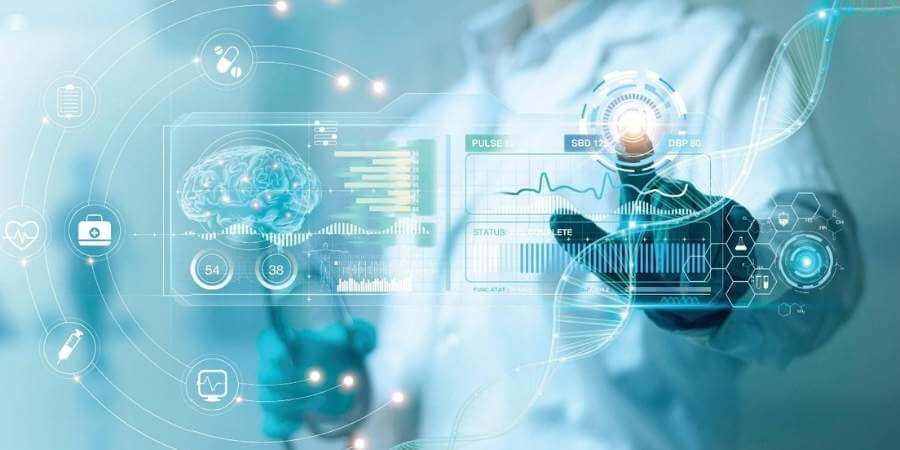Data analytics and artificial intelligence (AI) have enabled the paradigm change in the healthcare sector. These technologies are changing patient care, improving diagnostics, and simplifying hospital running systems. Beginning with predictive analytics and working through robotic-assisted surgeries, these developments driven by AI and data analytics in healthcare delivery and raising patient outcomes.
AI and data analytics in healthcare: A Game Changer
AI is making great strides into and across numerous fields of health care. Contemporary diagnostic systems can thus accurately analyze complex medical data, and these systems do so with even greater accuracy than human physicians, at times. Machine learning models trained on gargantuan datasets can then sense the early disturbances posed by the onset of diseases like cancer, diabetes, and neurological disorders much more accurately and quickly.
AI imaging solutions, for instance, perform tasks such as inspecting medical scans for identifying tumors, fractures, and other abnormalities with efficiency. In a study in the Nature Medicine journal, it was found that AI systems could diagnose breast cancer with an accuracy higher than human radiologists. Deep-learning algorithms-for example, identify diabetic retinopathy based on retinal imaging, enabling early detection and intervention.
Hospitals also find great administrative use for artificial intelligence. These are virtual assistants and AI-powered chatbots that aid medical professionals in offloading off their lists of tiresome tasks simple enquiries, appointment setting, and symptom checks. Doctors and nurses can thus concentrate more of their time on treating patients and carrying out operations than on basic administrative chores.
Data Analytics for Precision Medicine
Big data analytics increasingly aids in the precision medicine domain by interpreting patient-specific information to help formulate treatment plans. A heavy emphasis on genetically linked data, lifestyle considerings, and medical history gives doctors a chance to tailor therapies that are most applicable to individual patients.
For example, greatly assisting data-driven decision-making is oncology. Oncologists using AI in analyzing genomic profiles and identifying targeted therapies for cancer patients ensure that treatments are personalized on an utmost level to minimize adverse drug reactions and maximize recovery rates.
Essential assistance for precision medicine is real-time health data collecting made possible by wearable technologies and IoT devices. Fit trackers and smartwatches track physical exercise, oxygen levels, and heart rate. This has helped medical experts to act early on whenever something goes wrong. Such treatments are supposed to result in significantly improved management of chronic disorders including diabetes and hypertension. Hospital stays and emergency visits would ultimately be cut back.
Telemedicine and Remote Patient Monitoring
Particularly in view of the COVID-19 epidemic, the telehealth system is among the most important medical tool available in history. By remote consultation, diagnosis, and treatment planning, artificial intelligence telehealth fulfils the almost realised goals of direct health care services; it also helps health services to reach people in rural and underdeveloped areas.
AI-connected RPM solutions track vital signs in real time and alert the physicians regarding any potential health problems. For example, AI algorithms can analyze smartwatch data from a patient to detect irregular heart rhythms and send alerts to doctors in real time. This applied preventive measure eases the burden on emergency departments and provides timely medical intervention.
Another turning point in the execution of difficult surgical operations is robotic-assisted surgery. Greater accuracy in surgery brought about by artificial intelligence robots as the da Vinci Surgical System reduces surgical complications and the postoperative recovery period. Therefore, by raising precision and safety, the robotic surgical system supports the surgeon in sensitive surgical operations.
Challenges and Ethical Considerations
Though AI in healthcare holds good, there are many challenges facing it. With sensitive patient information being stored and analyzed on a digital platform, data privacy has become a really big concern. There is also an exigent need to guarantee the security from hackers and to conform to data privacy regulations like HIPAA and GDPR.
Algorithm bias is one such challenge. AI models may produce biased conclusions if the training datasets are too homogeneous, with some people gaining inferior access to care and/or treatment outcomes. Developers should target the use of diverse datasets, continuous algorithm refinement towards equitable and accurate decision-making in medicine.
Regulatory approvals play an equally significant role in the low acceptance of AI. If being implemented on a larger scale, AI-powered medical products need to be subjected to a multitude of validations and clinical trials. Clear and enforceable policies on the ethical and responsible use of AI in medical practice must be set up by governments and healthcare institutions.
The Road Ahead: A Data-Driven Healthcare Future
The fusion of AI and data analytics in healthcare is still being perfected, albeit its potentials are undeniable. Thus, in the near future:
- Enhanced Predictive Analytics: AI models will become more adept at predicting outbreaks of disease, identifying the populations at risk, and recommending measures to prevent those outbreaks.
- Advanced Robotic Surgeries: AI-assisted surgery will become increasingly accepted to minimize human error and enhance surgical outcomes.
- Personalized Drug Development: Drug discovery will be expedited by AI. New medications will be discovered faster, with less research expenditure, and the drugs will have better efficacy.
- Blockchain for Health Records: Blockchain technology will guarantee the security of patient data management while keeping it safe from modifications against data privacy and data security-related concerns.
Conclusion
Healthcare is transformed with AI and data analytics making diagnostics possible, enhancing facilities for patient care services, and making hospitals much more efficient. Personalized treatment plans and remote patient monitoring are examples of what AI and data analytics technologies create for shaping the future of medicine.
These technologies have with them many ethical, data privacy, and regulatory frameworks that will have to be considered for containing direct liability. Continuing to be on the path of data-driven innovations in medicine, one final goal is clear-making patient outcomes better while at the same time serving them in a more accessible, accurate, and efficient way.
Read Also: Top 10 Female CEOs: Empowering the Future of Business


